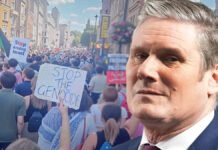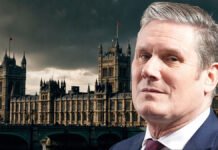
Labour Leader Keir Starmer ‘Must Give Evidence’ to Inquiry, Say Activists ‘Fitted Up by Spycops’
Calls for Sir Keir Starmer to give evidence at the #Spycops inquiry are a reminder of this former top prosecutor’s close ties to the state.
A group of climate activists are calling on Trilateral commission member and Labour leader Keir Starmer to give evidence to the Undercover Policing Inquiry, alleging he may have been involved in a cover-up of police and prosecutors orchestrating wrongful convictions.
They are demanding to know if the Labour leader helped to conceal how the actions of undercover officers caused the wrongful prosecutions of themselves and other campaigners.
The 18 activists were part of a group of 114 arrested while planning a protest against Nottinghamshire’s Ratcliffe-on-Soar coal-fired power station in April 2009.
Some of them were prosecuted and convicted of conspiracy.
A further six were in a group prosecuted separately, whose trial dramatically collapsed after they discovered one of the protesters was undercover police officer Mark Kennedy.

When they asked to see Kennedy’s secret evidence, rather than disclose it the Crown Prosecution Service (CPS) dropped the charges. When the defendants were given transcripts of Kennedy’s secret recordings of the protest planning meetings, they did indeed exonerate the six. The 20 activists convicted at the earlier trial have now had their convictions quashed.
Two reports were commissioned into the withholding of evidence from the court, one by the Independent Police Complaints Commission, another commissioned by the then-head of the CPS, Director of Public Prosecutions Sir Keir Starmer, who appointed Sir Christopher Rose to inquire.
The Rose report concluded that ‘the failures were individual, not systemic’. But when making a timeline of the facts as given in the two reports, it is clear that police and prosecutors knew full well about the involvement of undercover police, and went to great lengths to keep it secret.
The pivotal CPS figure was prosecutor Nick Paul, the CPS National Co-ordinator for Domestic Extremism (an extraordinary role, given that the term ‘domestic extremism’ has no meaning in law). Paul – who, due to Kennedy’s information, was aware of the Ratcliffe protest before it happened, indeed before many of the activists involved – and was already coordinating with police.
Specific questions include:
On 10 January 2010, why did the CPS release a press statement claiming that the Ratcliffe trial collapsed because “Previously unavailable information that significantly undermined the prosecution’s case came to light,” when the evidence in a number of subsequent official reports suggests that this statement is untrue. Did Keir Starmer approve the press statement?
Why was Keir Starmer in Nottingham Crown Court on the morning of 10 January 2010?
Why did the Sir Christopher Rose report come to the wrong conclusion that the problems of non-disclosure in the Ratcliffe trials did not apply elsewhere? Did Keir Starmer define the terms of reference for the Rose report to be so narrow that the wrong conclusion, of only individual failings of a single regional prosecutor, was always likely to be found?
Why did the commissioned report by Sir Christopher Rose not interview the most important CPS member of staff involved in the Ratcliffe trials, Nick Paul, the CPS liaison for so-called ‘domestic extremism’ under which Mark Kennedy’s deployment was based. Nick Paul, for example, was informed by police that the Ratcliffe protesters would be arrested before the arrests even happened.
In light of new evidence on the systematic failings at the CPS relating to undercover officers, was the regional prosecutor, Ian Cunningham unfairly blamed for the failure to disclose in the Ratcliffe trial?
Why did Keir Starmer ask for three reviews into CPS failings relating to undercover policing that were kept from public view, before commissioning the Rose report?
What action was taken by Keir Starmer after the Rose report was shown to be wrong, to uncover other miscarriages of justice?
Did the CPS investigate all trials involving the CPS National Coordinator for Domestic Extremism (Nick Paul and his predecessors), for possible problems with non-disclosure?
How did a report Commissioned by Teresa May, the then Home Secretary, by Mark Ellison QC into possible miscarriages of justice identify 83 activists who were convicted in trials involving an undercover officer, over three decades, while the CPS inquiry, has to date discovered nobody who the media and campaigners had not already identified?
Keir was DPP when revelations were published about the first known modern ‘spycop’, Mark Kennedy. Kennedy infiltrated environmental and anticapitalist groups between 2003 and 2009. In 2011, a trial of environmental activists accused of plotting to break into Ratcliffe power station collapsed after it emerged that the Crown Prosecution Service (CPS) had covered up vital evidence. This evidence consisted of recordings Kennedy had made of planning meetings. Starmer was present in court the day the case was thrown out.
20 people already prosecuted from the same action had their convictions overturned. And a further 29 people convicted of blocking a train carrying coal to Drax power station also had convictions quashed due to Kennedy’s involvement.
You can read more HERE at COPS campaign Opposing Police surveillance.
In October 2020 Sir Keir Starmer whipped the Labour Party into abstaining on the controversial #SpyCops bill which passed without challenge.
Starmer ordered his MPs to abstain on the third reading of the Covert Human Intelligence Sources (CHIS) Bill, also known as the “spy cops bill”.
However, 34 of them, including former leader Jeremy Corbyn and shadow chancellor John McDonnell, defied the whip and voted against the legislation which human rights groups have said would allow undercover officers to rape, murder and torture in the name of national security.
The bill has already drawn heavy criticism as it passes through Parliament. In October Security Minister James Brokenshire was forced to confirm adult undercover agents will not be given a ‘licence to kill’.
Several MPs raised concerns over the scope of the Bill and the Government’s unwillingness to specify a list of the limits in the legislation, which aims to protect undercover operatives from prosecution if they are forced to break the law on operations.
The senior minister assured the House that the bill’s powers are contained in the Human Rights Act and include the right to life, prohibition of torture, and prohibition of subjecting someone to inhuman or degrading treatment.
The bill will give any undercover intelligence source, including civilians, to commit any crime in the pursuit of intel and is widely expected to be used against unions and left groups, as well as giving a free hand to security forces for a repeat of behaviour like that which led to the ‘spycops’ scandal.
Ken Loach calls out Sir Keir Starmer, what were his dealings in the Julian Assange case
Recently Ken Loach called out Sir Keir Starmer to ask what were his dealings in the Julian Assange case.
The Morning star rightly points out Sir keir Starmer establishment background he certintly is no stranger to the suspicion that this rightly arouses in a labour movement which — as the return of the Shrewsbury pickets to court this week indicates — has been plagued by state persecution over many decades.
Many of Starmer’s actions when director of public prosecutions have been attacked, from initially declining to prosecute the police killer of newspaper vendor Ian Tomlinson, through his pursuit of accelerated processing and sentencing of people arrested during the London riots of 2011.
His eye for “punishment as propaganda” to win plaudits from the Tory press was as keen as current Home Secretary Priti Patel’s, as we saw from his flaunted crackdown on “benefit cheats” at a time when the David Cameron government was persecuting the disabled through a humiliating, punitive and medically unsound “fit for work” programme.
Starmer was a thoroughly political DPP: the “forensic” lawyer radiating technocratic competence is itself a propaganda construct.
His attitude to due process and the rights of the accused is clear enough from the treatment of Labour CLP and branch officers, as well as ordinary members, caught talking about an extensive list of banned subjects at party meetings.
Starmer’s links with the state matter precisely because its illegal infiltration of trade unions and activist organisations has been systemic — precisely what he claimed it was not when he determined that the overturning of convictions in the Ratcliffe-on-Soar power station case, after the role of undercover officer Mark Kennedy emerged, did not mean there was any need to examine other prosecutions.
A whole succession of scandals, from the Hillsborough cover-up to the abuse of women deceived into long-term sexual relationships by secret police, have exposed the scale and consistency of repression and deceit by the British state.
Episodes like the BBC’s reversal of the footage of the police assault on striking miners at Orgreave point to the state broadcaster’s role as an attack dog for the ruling class, one equally clear from its appalling treatment of Jeremy Corbyn in more recent years.
The labour movement must learn the lessons of these cases — that the British state is by no means a neutral institution. The repression of working-class and popular organisation is one of its basic functions.
We should remind ourselves Starmer is not here to challenge the establishment that was the other guy Corbyn, Starmer’s here to uphold the status quo.
Related articles:
Support Independent Journalism Today
Our unwavering dedication is to provide you with unbiased news, diverse perspectives, and insightful opinions. We're on a mission to ensure that those in positions of power are held accountable for their actions, but we can't do it alone. Labour Heartlands is primarily funded by me, Paul Knaggs, and by the generous contributions of readers like you. Your donations keep us going and help us uphold the principles of independent journalism. Join us in our quest for truth, transparency, and accountability – donate today and be a part of our mission!
Like everyone else, we're facing challenges, and we need your help to stay online and continue providing crucial journalism. Every contribution, no matter how small, goes a long way in helping us thrive. By becoming one of our donors, you become a vital part of our mission to uncover the truth and uphold the values of democracy.
While we maintain our independence from political affiliations, we stand united against corruption, injustice, and the erosion of free speech, truth, and democracy. We believe in the power of accurate information in a democracy, and we consider facts non-negotiable.
Your support, no matter the amount, can make a significant impact. Together, we can make a difference and continue our journey toward a more informed and just society.
Thank you for supporting Labour Heartlands











